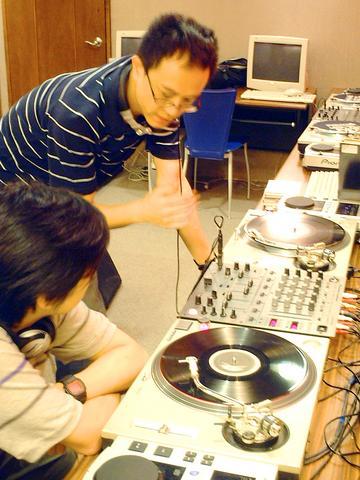EC Multimedia Technology (
"I was talking about the quality of DJs in Taiwan with a DJ friend of mine," said Zebra Chang (
Months later, in April of this year, she founded the program for her company that has since become one of its most successful, with some 20 students enrolled in one or the other of two varieties of courses.

PHOTO: DAVID MOMPHARD, TAIPEI TIMES
For NT$18,000 you get 18 hours of DJing basics with a faculty consisting of some of Taiwan's proven turntable talent, including Second Floor's resident DJ J6, DJs Edmund, Fish, Guangtou (
Class sizes are kept to two or three people but are often one-on-one sessions between teacher and student due to a limited amount of equipment The classes are sponsored in part by Pioneer, who donated several mixers and CD players, but EC's classroom has only a few pairs of Technics turntables.
The syllabus consists not only of hands-on basics like how to match beats and which knobs on the mixer to turn, but even more basic basics like how to buy records in vinyl-impoverished Taiwan.
"Probably the hardest thing about being a DJ here is finding the records that no one else has." @llen said. He lamented the closing years ago of AC-DC, the record store on Roosevelt Road owned and operated by Roxy 99's Lin Wei which was the preferred destination for the city's vinyl shoppers.
"There's no place like it any more," he said. "Now you have to order through the Internet or make trips to Bangkok just to buy records; or else find a friend that's going there."
Buying records aside, EC's more advanced course goes far beyond the basics to train students on Reason, the popular music production software, how to scratch, and even the ABCs of party promotion.
When the Taipei Times crashed EC's campus on Tuesday night, @llen was busy putting a student named Jimmy (
But will it help him land a residency at one of Taipei's clubs? @llen, who taught himself DJing, hinted that many of the students have signed up as much to make connections that will help them land gigs as to learn the trade.
"There are a lot of parties all the time. I'm sure there' ll be gigs in the future that I'll call him in on."
Hip-hop supervision is alive and well in Taiwan.
For more information on EC Multimedia Technology's DJing courses, visit the company's Web site at http://www.accmedia.com.tw/dj/

In the March 9 edition of the Taipei Times a piece by Ninon Godefroy ran with the headine “The quiet, gentle rhythm of Taiwan.” It started with the line “Taiwan is a small, humble place. There is no Eiffel Tower, no pyramids — no singular attraction that draws the world’s attention.” I laughed out loud at that. This was out of no disrespect for the author or the piece, which made some interesting analogies and good points about how both Din Tai Fung’s and Taiwan Semiconductor Manufacturing Co’s (TSMC, 台積電) meticulous attention to detail and quality are not quite up to

April 21 to April 27 Hsieh Er’s (謝娥) political fortunes were rising fast after she got out of jail and joined the Chinese Nationalist Party (KMT) in December 1945. Not only did she hold key positions in various committees, she was elected the only woman on the Taipei City Council and headed to Nanjing in 1946 as the sole Taiwanese female representative to the National Constituent Assembly. With the support of first lady Soong May-ling (宋美齡), she started the Taipei Women’s Association and Taiwan Provincial Women’s Association, where she

Chinese Nationalist Party (KMT) Chairman Eric Chu (朱立倫) hatched a bold plan to charge forward and seize the initiative when he held a protest in front of the Taipei City Prosecutors’ Office. Though risky, because illegal, its success would help tackle at least six problems facing both himself and the KMT. What he did not see coming was Taipei Mayor Chiang Wan-an (將萬安) tripping him up out of the gate. In spite of Chu being the most consequential and successful KMT chairman since the early 2010s — arguably saving the party from financial ruin and restoring its electoral viability —

It is one of the more remarkable facts of Taiwan history that it was never occupied or claimed by any of the numerous kingdoms of southern China — Han or otherwise — that lay just across the water from it. None of their brilliant ministers ever discovered that Taiwan was a “core interest” of the state whose annexation was “inevitable.” As Paul Kua notes in an excellent monograph laying out how the Portuguese gave Taiwan the name “Formosa,” the first Europeans to express an interest in occupying Taiwan were the Spanish. Tonio Andrade in his seminal work, How Taiwan Became Chinese,